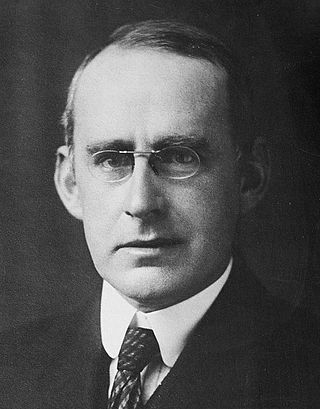In grammar, tense is a category that expresses time reference. Tenses are usually manifested by the use of specific forms of verbs, particularly in their conjugation patterns.
In linguistics, aspect is a grammatical category that expresses how a verbal action, event, or state, extends over time. For instance, perfective aspect is used in referring to an event conceived as bounded and unitary, without reference to any flow of time during the event. Imperfective aspect is used for situations conceived as existing continuously or habitually as time flows.
In linguistics, a participle is a nonfinite verb form that has some of the characteristics and functions of both verbs and adjectives. More narrowly, participle has been defined as "a word derived from a verb and used as an adjective, as in a laughing face".

The arrow of time, also called time's arrow, is the concept positing the "one-way direction" or "asymmetry" of time. It was developed in 1927 by the British astrophysicist Arthur Eddington, and is an unsolved general physics question. This direction, according to Eddington, could be determined by studying the organization of atoms, molecules, and bodies, and might be drawn upon a four-dimensional relativistic map of the world.
In grammar, a future tense is a verb form that generally marks the event described by the verb as not having happened yet, but expected to happen in the future. An example of a future tense form is the French achètera, meaning "will buy", derived from the verb acheter. The "future" expressed by the future tense usually means the future relative to the moment of speaking, although in contexts where relative tense is used it may mean the future relative to some other point in time under consideration.
In linguistics, a defective verb is a verb that either lacks a conjugated form or entails incomplete conjugation, and thus cannot be conjugated for certain grammatical tenses, aspects, persons, genders, or moods that the majority of verbs or a "normal" or regular verb in a particular language can be conjugated for. That is to say, a defective verb lacks forms that most verbs in a particular language have.
Shall and will are two of the English modal verbs. They have various uses, including the expression of propositions about the future, in what is usually referred to as the future tense of English.
The past tense is a grammatical tense whose function is to place an action or situation in the past. Examples of verbs in the past tense include the English verbs sang, went and washed. Most languages have a past tense, with some having several types in order to indicate how far back the action took place. Some languages have a compound past tense which uses auxiliary verbs as well as an imperfect tense which expresses continuous or repetitive events or actions. Some languages inflect the verb, which changes the ending to indicate the past tense, while non-inflected languages may use other words meaning, for example, "yesterday" or "last week" to indicate that something took place in the past.

The going-to future is a grammatical construction used in English to refer to various types of future occurrences. It is made using appropriate forms of the expression to be going to. It is an alternative to other ways of referring to the future in English, such as the future construction formed with will – in some contexts the different constructions are interchangeable, while in others they carry somewhat different implications.

Spanish verbs form one of the more complex areas of Spanish grammar. Spanish is a relatively synthetic language with a moderate to high degree of inflection, which shows up mostly in Spanish conjugation.
A hodiernal tense is a grammatical tense for the current day.
A hesternal tense is a past tense for the previous day.
In French grammar, verbs are a part of speech. Each verb lexeme has a collection of finite and non-finite forms in its conjugation scheme.
The private language argument argues that a language understandable by only a single individual is incoherent. It was introduced by Ludwig Wittgenstein in his later work, especially in the Philosophical Investigations. The argument was central to philosophical discussion in the second half of the 20th century.
Jam tomorrow is an expression for a never-fulfilled promise, or for some pleasant event in the future, which is never likely to materialize. Originating from a bit of wordplay involving Lewis Carroll's Alice, it has been referenced in discussions of philosophy, economics, and politics.
Relative tense and absolute tense are distinct possible uses of the grammatical category of tense. Absolute tense means the grammatical expression of time reference relative to "now" – the moment of speaking. In the case of relative tense, the time reference is construed relative to a different point in time, the moment being considered in the context. In other words, the reference point is the moment of discourse or narration in the case of absolute tense, or a different moment in the case of relative tense.
Tense–aspect–mood or tense–modality–aspect is an important group of grammatical categories, which are marked in different ways by different languages.
In linguistics, the prospective aspect is a grammatical aspect describing an event that occurs subsequent to a given reference time. One way to view tenses in English and many other languages is as a combination of a reference time in which a situation takes place, and the time of a particular event relative to the reference time. As an example, consider the following sentence:

Modern standard English has various verb forms, including:

Tomorrow is a temporal construct of the relative future; literally of the day after the current day, or figuratively of future periods or times. Tomorrow is usually considered just beyond the present and counter to yesterday. It is important in time perception because it is the first direction the arrow of time takes humans on Earth.




